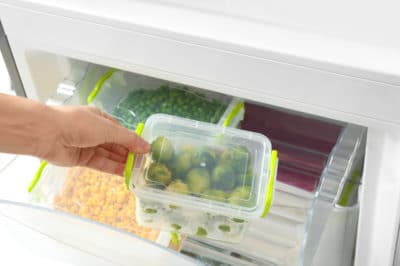The fresh season
From the freezer, Brussels sprouts can enrich our dishes all year round. But when is his fresh season in this country? Because then it is not only the ideal time to enjoy it fresh, but also to replenish the stock in the freezer.
September is the first month in which fresh Brussels sprouts can be harvested in the garden. If you can’t harvest, you can now find it cheaply in the supermarket, usually portioned in nets. The supply does not stop until March.
Rose cabbage needs frost
Brussels sprouts harvested early in the season can taste bitter. The reason for this undesirable taste component is the still abundant bitter substances. Only the frost takes the bitterness out of the Brussels sprouts and gives them a mild aroma.
If you want to prepare fresh Brussels sprouts, it is better to wait until after the first frost. However, the Brussels sprouts make no difference between the natural cold outdoors and the cold in the freezer. The Brussels sprouts may enter it bitterly, as long as they are freshly picked. Defrosted again, it surprises with a mild taste.
The four working steps to the freezer
Brussels sprouts require some time and attention before they can be stored in the freezer. The preliminary work can be roughly divided into four steps:
- cleaning
- blanching
- shock freezing
- freezing
- Clean the Brussels sprouts
The Brussels sprouts must be thoroughly cleaned before freezing:
- remove outer and wilted leaves
- separate protruding stink
- wash thoroughly
Hint
Scratch the Brussels sprouts crosswise on the stink side so that they cook more evenly later.
Short Blanching
Place the Brussels sprouts in boiling salted water for about two minutes. Bite strength is maintained if the blanched cabbage sprouts are then immediately quenched with ice water.
After the Brussels sprouts have cooled, they are removed from the ice water and placed on kitchen paper to dry.
- shock freezing whenever possible
Spread the dry Brussels sprouts on a tray and put it in the freezer for about 30 minutes where it can freeze. If your freezer has a quick freezing function, it should be used now.
Since the Brussels sprouts do not touch each other on the tray, they do not freeze against each other even later and can be easily removed individually.
Freezing: the last moves
Finally, all that remains is to fill the frozen Brussels sprouts into suitable freezer containers, label them and place them back in the freezer.
Shelf life and use
The shelf life of frozen Brussels sprouts is 6 months. It can be added directly from the freezer into boiling food or boiling water. Since it is already blanched, the cabbage needs only about 10 to 12 minutes cooking time, depending on how big the heads are.
Conclusion for quick readers
- Fresh season: Brussels sprouts are available fresh in winter. It is worthwhile to build up a frozen stock
- Frost: Icy temperatures remove the bitter substances from the Brussels sprouts and make them milder.
- Alternative: The frost in the chest also causes a milder taste.
- Preparation: Remove outer and wilted leaves; separate stunk; wash thoroughly.
- Tip: Slice the Brussels sprouts crosswise, then cook them more evenly later.
- Blanching: Put the Brussels sprouts in boiling salted water for two minutes and then rinse in ice water.
- Shock freezing: Drained Brussels sprouts shock-freeze for 30 minutes, the sprouts must not touch each other; prevents sticking together
- Freeze it: Fill the Brussels sprouts into suitable containers, label them and place them in the freezer.
- Shelf life: The shelf life of Brussels sprouts is six months.
- Defrost: Put deep-frozen sprouts directly into boiling liquid; cooking time approx. 10 to 12 minutes
